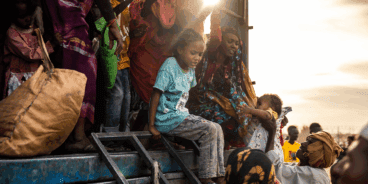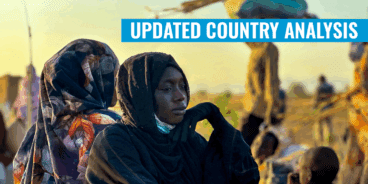
SDG 16 and the Victims of Ethnic and Religious Violence in the Middle East: Measures to Achieve Accountability and Reconciliation
Speech delivered by Dr. Simon Adams, Executive Director of the Global Centre for the Responsibility to Protect, at the Third International Ministerial Conference on the Victims of Ethnic and Religious Violence in the Middle East, Brussels, Belgium, 14 May 2018.
Thank you to the governments of Belgium and Lebanon, it is an honor to be invited here to speak to you today.
These are dark times. When we look at the global situation, we see that international humanitarian and human rights law are under unprecedented attack, with the perpetration of mass atrocities becoming almost routine in a number of conflicts. One region in particular has borne the brunt of the suffering. Although the Middle East and North Africa is home to only 5 percent of the world’s population, in 2014 the region accounted for 45 percent of the world’s terrorist incidents, 58 percent of battle-related deaths, 47 percent of internally displaced people, and 58 percent of refugees.
The number of people in the world displaced by persecution, conflict and atrocities is now at its highest level since the end of the Second World War, with 17.5 million people displaced in Yemen, Syria and Iraq alone.
Such statistics serve as a reminder that when armed conflicts metastasize they can destabilize entire regions and jeopardize millions of lives, throwing the international system into crisis and disrepute. This is why the prevention of mass atrocity crimes and upholding our collective responsibility to protect must be at the heart of our shared mission. Using Goal 16 of the Sustainable Development Goals (SDGs), over the next decade we need to improve our use of tools to help ameliorate conflicts where identity politics, social marginalization, economic inequality and resource disputes threaten fragile societies. And there is possibly nowhere in the world where this mission is more important than in the Middle East with regard to protecting vulnerable religious and ethnic minorities.
In particular, I want to emphasize that there is an intrinsic link between accountability and the prevention of mass atrocities. This forms an essential part of how we build resilient societies and meet the targets of SDG 16.
History teaches us that accountability for mass atrocity crimes is not only a deterrent, but that international justice can be contagious. For victims, recognition of their suffering and accountability for crimes perpetrated against them can have immense restorative value. I have seen this myself previously in Rwanda, South Africa and East Timor. As an individual whose family emigrated from Northern Ireland I know only too well that history, ethnic identity and sectarianism can be weaponized to breed division and bloody civil conflict. I know also how difficult it is for families who have lost a loved one to reconcile with the people and authorities that were responsible.
Which brings me to one of the central causes for the cycle of violence that has plagued Iraq – the failure to adequately address past injustices and to overcome historic inter-communal grievances.
Prior to 2014 there were many voices within international civil society warning of the increasing political and sectarian tensions within Iraq. The Global Centre, for example, published reports saying that Iraqi civilians faced an imminent risk of atrocities in 2013, a year before Da’esh swept across the Nineveh Plain. Yet, in spite of clear warning signs, there was no substantive and timely action. Then in the summer of 2014 the so-called Islamic State in Iraq and the Levant (ISIL, ISIS or Da’esh), launched a systematic campaign of mass atrocities in northern Iraq. Consequently, Iraq suffered its second genocide in three decades (the first being against the Kurds in 1988, the second being against the Yazidi in 2014).
Yet, as of today, the prosecutions of Da’esh members that have been carried out have overwhelmingly focused on terrorism-related crimes, with several hasty mass hangings taking place. There have also been examples of recriminations and reprisals against communities who are blamed for supporting Da’esh. But without the genuine pursuit of accountability, justice and reconciliation between the various ethnic and religious communities within Iraq, we fear that lasting peace cannot and will not be achieved.
Practical steps are necessary to break the cycle of impunity. On 21 September last year the UN Security Council passed Resolution 2379, establishing an Investigative Team to support domestic efforts to hold Da’esh accountable by collecting and preserving evidence of its atrocities in Iraq.
The Global Centre worked closely with our Yazidi friends, with the Iraqi, Belgian and United Kingdom governments, and with other UN Security Council members, for the establishment of the investigative mechanism. This is a first step on the long path towards justice for victims of atrocities, but it has still not been operationalized.
This is of crucial importance because we have arrived at yet another key turning point in the history of Iraq. Da’esh has been defeated. Two days ago Iraq held successful national elections.
And so there is now a historic opportunity. The new Iraqi government should, with international support, pursue justice for all victims of atrocities throughout the country, and facilitate comprehensive reconciliation between the many ethnic and religious communities of Iraq. Ensuring due process in accordance with international law remains essential, and the government of Iraq should adopt enabling legislation to fully incorporate genocide, war crimes and crimes against humanity into domestic law.
There also remains an urgent need for coordinated physical protection of those populations who remain at-risk of further violence, including religious minorities such as the Yazidi or Christian communities, but also Sunni civilians at risk of reprisals from militias in territory recaptured from Da’esh.
If the opportunity to promote reconciliation is not seized, we know what will happen – the cycle of conflict, violence and atrocities will repeat itself. But Iraq does not have to be a prisoner of its history. Another Iraq is possible – one that not only acknowledges the pain and suffering of the past but upholds its responsibility to protect all its diverse peoples. An Iraq where no ethnic or religious community is marginalized or silenced.
That is not just the lesson of Iraq. It is a warning from history for Syria and for other countries in the region.
Branching out very quickly from the issue of SDG 16, I’d also like to make a special plea regarding education. It is hard to imagine a better future for Syria, Yemen or Iraq if the next generation lacks the education, skills and knowledge to build a post-conflict society. UNICEF recently estimated that there were nearly 24 million children in 22 countries affected by conflict who were unable to attend school. This included, for example, approximately half of all children in Syria.
At its best, education illuminates the mind and enables us to engage with the world. Education also plays an essential role in teaching us the sometimes ugly truth about the past and can help to build a new post-conflict narrative. This can play an essential role in the reconciliation process. Again, I have seen this with my own eyes in South Africa and elsewhere.
Children who are not in school, who are languishing in refugee camps, or trapped in conflict ridden societies, are also most at risk of being recruited as child soldiers or by violent extremists, or of being forced into exploitative labor or child slavery. This is a huge risk that is apparent in the Middle East today.
Education is not a luxury, it is a universal right and an important tool for preventing the recurrence of conflict. Or in other words, SDG 16 and SDG 4 are intrinsically linked.
Finally, let me end by saying that we live in troubled times. We are engaged in a battle to defend the human rights and humanitarian norms that have been developed over the last century, and to ensure that they continue to have meaning for the most vulnerable people in the world. States must take practical action to protect those norms and support efforts towards accountability and reconciliation in Iraq, Syria and elsewhere. All members of the international community can contribute.
Championing innovative accountability mechanisms through the UN Security Council, General Assembly or Human Rights Council – such as the Iraq Investigative Team and the International, Impartial, Investigative Mechanism created to investigate atrocities in Syria – is essential. States should share information and evidence and provide financial and technical support if possible.
Additionally, governments can offer crucial capacity building assistance to states recovering from mass atrocities. This can include offering training for judicial and court personnel, or supporting the provision of psychological and medical care for survivors of atrocities. Countries that have previously experienced mass atrocities can also share best practices in creating national strategies to achieve accountability, justice and reconciliation.
Across the Middle East, those who foster division and who commit mass atrocities would like nothing better than a return to the world of indifference, inaction and impunity. We must not allow that to happen. SDG 16 – linking developmental outcomes with the construction of resilient societies – is an essential component of the ongoing struggle to build a Middle East that respects and protects all its diverse populations, especially its vulnerable minorities.
I thank you.
Related Publications


Atrocity Alert No. 459: Sudan, Ukraine and Conflict-Related Food Insecurity
